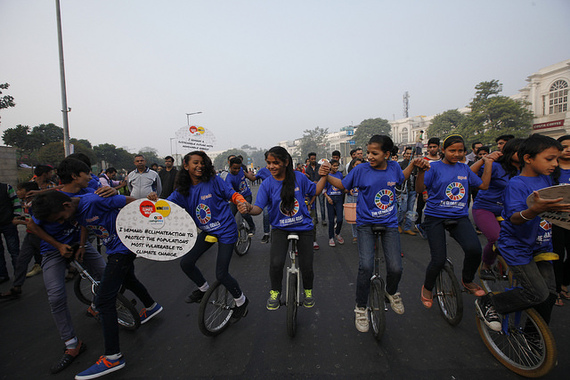Image copyright: action/2015
In September this year world leaders committed to a new set of Global Goals for Sustainable Development that could help end extreme poverty, fight inequality and tackle climate change, if governments commit to full, successful and accountable implementation over the next 15 years.
The first test for leaders to show their commitment to these goals is to deliver a bold new international climate agreement that will protect people and communities' human rights to life, a healthy environment, to food, water, sanitation, housing, health, and in particular people and communities that are already disadvantaged.
As ministers set off for this week's crunch United Nations climate change negotiations in Paris they should be reminded that protecting people from climate change is essential in order to respect, protect and fulfil human rights.
The UN Human Rights Council has recognized that "the world's poor are especially vulnerable to the effects of climate change." It emphasized that the impacts of increased temperatures and sea level rise affect most acutely "those segments of the population who are already in vulnerable situations owing to factors such as geography, poverty, gender, age, indigenous or minority status and disability." Climate impacts are already hitting home in all corners of the world, affecting the most vulnerable hardest of all. Storms are strengthening, droughts are lasting longer and floods are worsening all of which will make it much harder for millions of people to find water, afford food and have shelter.
Addressing global climate change and ensuring human rights for all are two sides of the same coin. We cannot deliver sustainable development and human rights to all without tackling climate change, and we cannot tackle climate change without addressing the root causes of poverty, inequality and unsustainable development patterns.
The UN Climate Summit is a crucial moment to achieve a new international agreement on climate, applicable to all countries, that could set us on a path to a healthier and fairer world for everyone. In this agreement, governments, especially those from countries that have contributed to the problem, and have significant resources, have the biggest responsibility to act. To comply with their human rights obligations, they must take deliberate and serious steps to phase out fossil fuels and ensure access to 100% sustainable renewable energy for all within the shortest possible time. They must stop wasteful production and consumption, and provide support for those harmed by a changing climate. Governments have obligations under international law to end discrimination and ensure economic, social and cultural rights for all. This is critical for disadvantaged communities whose already precarious livelihoods are threatened by pollution primarily produced to fuel other people's prosperity.
Governments must agree to effective mechanisms to address loss and damage to ensure remedies for those who lose their homes, their livelihoods and who face other negative impacts that harm their human rights.
In Paris world leaders have an opportunity to provide support to those already suffering the impacts of climate change while addressing the needs of the most disadvantaged. Human rights law not only requires governments to take action to protect people from climate change; it also provides guidance on how to do so. Addressing climate change will require governments to transform our economies and our societies. In doing so, governments must respect, protect, promote and fulfil human rights for all, including the rights of Indigenous Peoples and for current and future generations. They have ensure that the coming transformation advances, rather than undermines gender equality; that it is developed in a way that is participatory, that it guarantees the rights to food, water, sanitation and other human rights. In short, it's a real opportunity to put the recently adopted SDGs into action.
So let us make sure that governments include in the operative section of the core agreement a commitment to ensure that their climate related actions fully mainstream their human rights obligations. This will send a clear message that governments will take concrete steps to mainstream human rights - as they are already legally bound to do - in the implementation of the Climate Convention.
By integrating human rights into climate policies, countries will strengthen the long-term effectiveness of, and further build broad public support for, climate action. Such an agreement would promote the rights of every child, man and woman on this planet and help ensure that the world's poorest do not suffer the most severe impacts of climate change and are not adversely affected by climate policies.
That's why, on 29 November, as the UN climate talks began in Paris, citizens around the world took to the streets for the Global Climate March, calling on governments to take immediate action for a safer and fairer world where everyone - present and future generations - are able to lead dignified lives enriched with opportunity. Rather than posturing and catering to powerful vested interests, governments must listen to the voices of the world's people, especially the most marginalized. If they do not, they will have to contend with millions of disappointed people across the world, thousands of civil society organizations, national courts and international human rights monitoring bodies, who will hold them to account. The ball is in their court.
This post is part of a "Climate Justice" series produced by The Huffington Post, in conjunction with the U.N.'s 21st Conference of the Parties (COP21) in Paris (Nov. 30-Dec. 11), aka the climate-change conference. The series will put a spotlight on populations who are adversely affected by climate change. To view the entire series, visit here.
